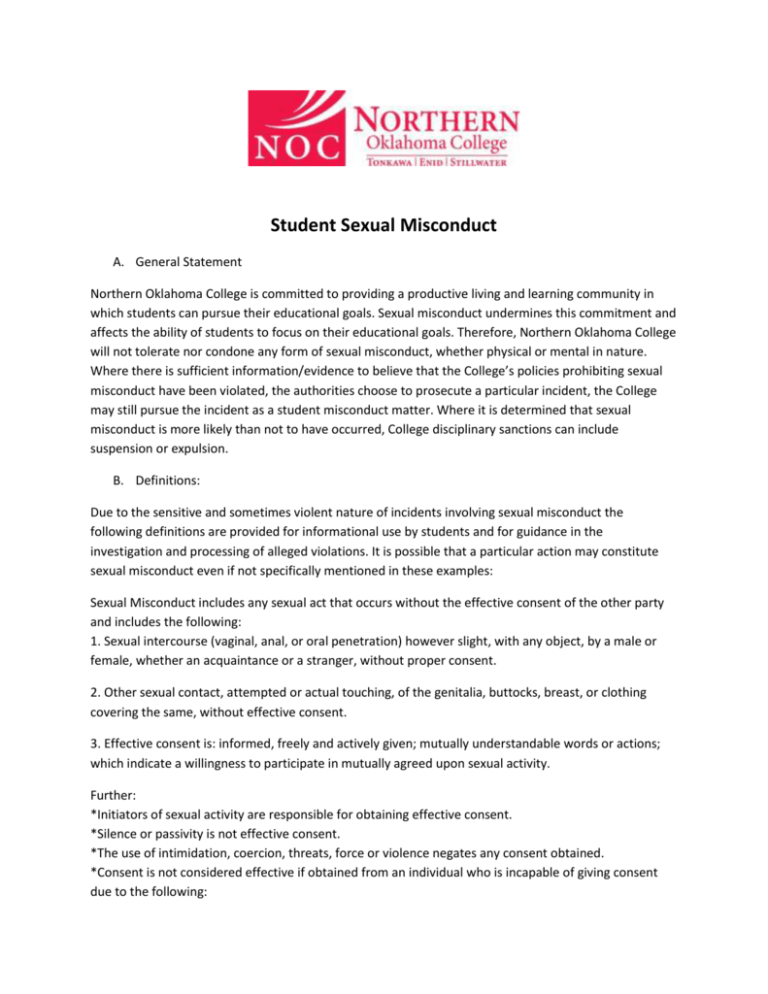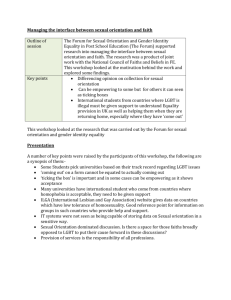Student Sexual Misconduct - Northern Oklahoma College
advertisement

Student Sexual Misconduct A. General Statement Northern Oklahoma College is committed to providing a productive living and learning community in which students can pursue their educational goals. Sexual misconduct undermines this commitment and affects the ability of students to focus on their educational goals. Therefore, Northern Oklahoma College will not tolerate nor condone any form of sexual misconduct, whether physical or mental in nature. Where there is sufficient information/evidence to believe that the College’s policies prohibiting sexual misconduct have been violated, the authorities choose to prosecute a particular incident, the College may still pursue the incident as a student misconduct matter. Where it is determined that sexual misconduct is more likely than not to have occurred, College disciplinary sanctions can include suspension or expulsion. B. Definitions: Due to the sensitive and sometimes violent nature of incidents involving sexual misconduct the following definitions are provided for informational use by students and for guidance in the investigation and processing of alleged violations. It is possible that a particular action may constitute sexual misconduct even if not specifically mentioned in these examples: Sexual Misconduct includes any sexual act that occurs without the effective consent of the other party and includes the following: 1. Sexual intercourse (vaginal, anal, or oral penetration) however slight, with any object, by a male or female, whether an acquaintance or a stranger, without proper consent. 2. Other sexual contact, attempted or actual touching, of the genitalia, buttocks, breast, or clothing covering the same, without effective consent. 3. Effective consent is: informed, freely and actively given; mutually understandable words or actions; which indicate a willingness to participate in mutually agreed upon sexual activity. Further: *Initiators of sexual activity are responsible for obtaining effective consent. *Silence or passivity is not effective consent. *The use of intimidation, coercion, threats, force or violence negates any consent obtained. *Consent is not considered effective if obtained from an individual who is incapable of giving consent due to the following: *a mental, developmental, or physical disability; or *s/he is under the legal age to give consent (Oklahoma law states that the legal age of consent is 16); or *s/he is intoxicated by alcohol, beer or under the influence of drugs. Individuals who commit acts of sexual misconduct assume responsibility for their behavior and must understand that the use of alcohol or other drugs does not reduce accountability for their actions. Examples of violations: *Ignoring an individual’s protest and engaging in sexual activity is a violation. *Convincing somebody to have sex is likely to constitute intimidation or coercion. If someone is coerced the yes is not effective consent. *Drinking and/or drug use may render the individual incapable of giving consent for sexual activity. For example, someone who is intoxicated may agree to have sex at the time, but have no memory of the consent. This person may have been functioning in a “blackout” and therefore did not give effective consent. *Holding a person down or preventing a person from leaving the room and engaging in sexual activity against his/her will is a violation. Sexual harassment includes unwelcome sexual advance, requests for sexual favors, and other verbal or physical contact of a sexual nature, or using social media to violate a person’s right to privacy, intended or not, by using pictures or comments that would be considered as intimidation or sexually embarrassing to that person when: *Submission to such conduct is made explicitly or implicitly a term or condition of leadership, membership in an organization, student social events, academic standing, or participation in any College activity. *Submission to or rejection of such conduct by an individual is used as a basis for evaluation, particularly in making employment or academic decisions affecting the individual; or *Such conduct has the purpose or effect of unreasonably interfering with the other individual’s performance or creating an intimidating, hostile, or offensive educational and College environment. C. To consult about or report incidents of sexual misconduct or sexual harassment: When the accused is a student, contact the following people on your campus. Northern Oklahoma College-Tonkawa Dean Ryan Paul Student Affairs Office, Administration Building 580-628-6240, ryan.paul@noc.edu Northern Oklahoma College – Enid Dean Bradley Jennings Student Affairs Office, Everett Administration Building 580-548-2327, bradley.jennings@noc.edu Northern Oklahoma College-Stillwater Paula Lewis, Counselor 405-744-2235, paula.lewis@noc.edu Debbie Quirey, Vice President 405-744-2212, debbie.quirey@noc.edu Oklahoma State University campus Kevin Kraft, Coordinator of Student Conduct Education and Administration 326 Student Union 405-744-5470, student.conduct@okstate.edu When the accused is a Northern Oklahoma college employee, refer to the Institutional Policy Relevant to Sexual Harassment , located in the Student Rights and Responsibilities handbook. In doing so, contact the appropriate administrative personnel for an information resolution, usually at the level nearest the occurrence or the Office of Student Affairs to file a formal, written complaint or grievance. D. If you have been sexually assaulted: 1. Do what you need to feel safe: *Call 911 immediately if you believe you are in danger *Get to a safe place or call a supportive friend or advocate 2. Do not shower, bathe, douche, change or destroy clothes; do not eat drink, smoke or chew gum; do not take any medications. Preserving evidence for possible criminal prosecution is important. 3. See medical help-to gather evidence for possible criminal prosecution and for treatment of any possible injuries. 4. Decide whether to file a report with police (Tonkawa – 580-628-2516, Enid – 580-548-2427000, Stillwater – 405-372-4171, OSU – 405-744-6523) 5. Seek support and counseling. On campus resources include: *NOC-Tonkawa (580-628-6651) *NOC-Enid (580-548-2256) *NOC-Stillwater: Oklahoma State University Student Counseling Center (405-744-5472) or Psychological Services Center (405-744-5975) E. Sexual Misconduct Special Concerns: Northern Oklahoma College encourages the reporting of instances of sexual misconduct. To assure a proper balance between the rights and interests of the alleged victim of sexual misconduct and the alleged perpetrator of an act of sexual misconduct, including encouraging alleged victims to testify and otherwise actively participate in the discipline process, the following measures are adopted by the College for application to hearings regarding alleged instances of sexual misconduct. 1. Special Mandatory Rights in Cases Involving Alleged Sexual Misconduct a. The alleged victim shall be permitted to have a person or persons of his or her own choosing accompany him or her throughout the disciplinary hearing; b. The alleged victim shall be permitted to be present during the entire disciplinary hearing (except during deliberations of the panel); c. The alleged victim shall have the right to be informed of the outcome of the hearing upon its conclusion by the panel; and, d. The person alleged to have engaged in sexual misconduct shall also be afforded all of the rights set forth in this section. 2. Discretionary Procedures Additionally, in the discretion of the panel reviewing a particular case, the following procedures may be deemed appropriate for use in conducting a review hearing regarding a case of alleged sexual misconduct. A panel shall have no duty to grant such measures in any case under review, but should consider the appropriateness of permitting such accommodations: a. The panel may, in its discretion, exclude evidence regarding the past sexual history of the alleged victim from discussion during the hearing. The past sexual history of the alleged victim with persons other than the alleged perpetrator shall be presumed irrelevant; and b. The alleged victim may be given the opportunity to make a statement to the panel regarding the impact that the alleged actions have had in his/her life and educational relationship with the College, if the alleged perpetrator is found to have engaged in sexual misconduct.






